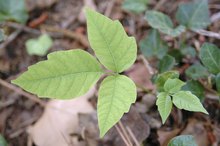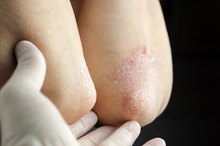Light Brown Flaky Discoloration on the Skin
If you notice light brown patches that are flaky and irritated on your skin, it's possible that you have eczema. Although this skin condition isn't life-threatening, it can be a nuisance, as the flaky patches can be itchy, tight and uncomfortable. The key to dealing with eczema is to educate yourself about the condition.
Definition
Eczema is a skin condition that has several subcategories. For instance, if your skin has become irritated after exposure to an irritant, you may have contact dermatitis, says the website EczemaNet. When on the scalp, it is seborrheic dermatitis. Even diaper rash is a kind of eczema.
- Eczema is a skin condition that has several subcategories.
- When on the scalp, it is seborrheic dermatitis.
Causes
What Are the Causes of Intense Painful Itching?
Learn More
Although not all causes of eczema are known, a common type -- contact dermatitis -- results from exposure to an irritant. Common substances include harsh chemicals and soaps. In heredity-linked forms of eczema, the skin may be too porous and unable to hold onto moisture. This results in dry, cracked and flaky skin.
- Although not all causes of eczema are known, a common type -- contact dermatitis -- results from exposure to an irritant.
Symptoms
The symptoms of eczema can vary quite a bit from person to person, but brown patchy skin is common. These patches are often very itchy and may feel very dry. The skin may look cracked or thicken over time, says the Nemours KidsHealth website 1. In severe cases, these areas of skin may bleed.
- The symptoms of eczema can vary quite a bit from person to person, but brown patchy skin is common.
Treatments
Follicular Eczema
Learn More
Treating eczema can be difficult. It usually involves the application of topical steroids, which are available over-the-counter and by prescription, according to KidsHealth 1. Creamy emollient lotions may also be used to soften and moisturize the tough skin. Antihistamines might be recommended to relieve itching and discomfort. There is no cure for eczema, but with proper management, you can reduce the number of flare-ups that you experience.
- Treating eczema can be difficult.
- Creamy emollient lotions may also be used to soften and moisturize the tough skin.
Prevention
Even though hereditary eczema is not preventable, you can prevent outbreaks by avoiding triggers. Typical allergens or irritants like animal dander, mold, dust and pollen should be avoided, as well as strong soaps and chemicals, suggests KidsHealth 1. Stay away from smokers and moisturize heavily during the winter months to stop your skin from drying out too much. If you do have an eczema flare-up, avoid scratching, which can make it worse.
- Even though hereditary eczema is not preventable, you can prevent outbreaks by avoiding triggers.
- If you do have an eczema flare-up, avoid scratching, which can make it worse.
Related Articles
References
- KidsHealth.org: Eczema
- EczemaNet: What is Eczema?
- Murota H, Yamaga K, Ono E, Murayama N, Yokozeki H, Katayama I. Why does sweat lead to the development of itch in atopic dermatitis?. Exp Dermatol. 2019;28(12):1416-1421. doi:10.1111/exd.13981
- David Boothe W, Tarbox JA, Tarbox MB. Atopic dermatitis: Pathophysiology. Adv Exp Med Biol. 2017;1027:21-37. doi:10.1007/978-3-319-64804-0_3
- US National Library of Medicine, Genetics Home Reference. FLG gene. Filaggrin. Updated January 21, 2020.
Writer Bio
Brenda Barron is a writer, editor and researcher based in Southern California. She has worked as a writer since 2004, with work appearing in online and print publications such as BabyZone, "Cat Fancy" and "ePregnancy." She holds a Bachelor of Arts in English literature from California State University, Long Beach.









